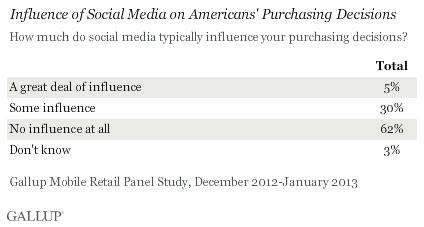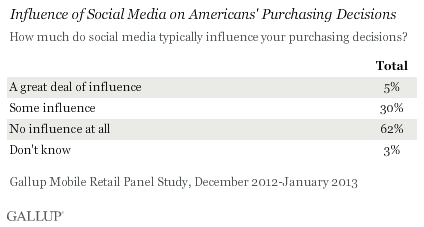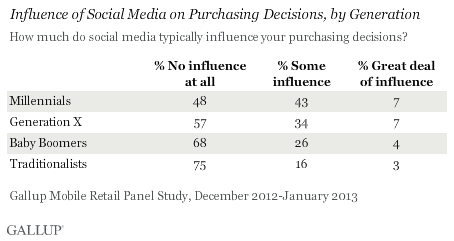U.S. companies spent $5.1 billion in social media advertising in 2013, but Americans aren't listening

A free daily email with the biggest news stories of the day – and the best features from TheWeek.com
You are now subscribed
Your newsletter sign-up was successful
Social media is pretty huge. Each day Facebook users post 4.75 billion items of content. Twitter users send 400 million tweets. Instagram users like 1.2 billion photos and YouTube users watch 4 billion videos.
U.S. companies spent $5.1 billion on social media advertising in 2013. That's nothing to sniff at, and a significant chunk of the $64.5 billion U.S. advertisers spent in total.
But it doesn't seem like money is winning a great deal of influence. That's because — as a recent Gallup poll reveals — just 5 percent of Americans believe social media exerts "a great deal of influence" on their purchasing decisions, and a strong 62 percent majority of Americans are not influenced at all by social media:
The Week
Escape your echo chamber. Get the facts behind the news, plus analysis from multiple perspectives.

Sign up for The Week's Free Newsletters
From our morning news briefing to a weekly Good News Newsletter, get the best of The Week delivered directly to your inbox.
From our morning news briefing to a weekly Good News Newsletter, get the best of The Week delivered directly to your inbox.

(Gallup)
So how worried should firms like Facebook and Twitter that are dependent on social media advertising for revenue be? Probably not so much. Social media advertising is a relatively new phenomenon. Firms are still learning how to use the new media to make money, and there are already success stories.
And there is hope in the shape of America's changing demographics. Millennials are more engaged with social media than their elders, with 50 percent saying that social media media has "some" or a "great deal" of influence over their purchasing decisions.

(Gallup)
A free daily email with the biggest news stories of the day – and the best features from TheWeek.com
As the advertising industry gets better at using social media to sell products, and as millennials' incomes grow as they enter the work force and mature, the chances are that the market for social media advertising will grow, too.
John Aziz is the economics and business correspondent at TheWeek.com. He is also an associate editor at Pieria.co.uk. Previously his work has appeared on Business Insider, Zero Hedge, and Noahpinion.
-
 ‘Those rights don’t exist to protect criminals’
‘Those rights don’t exist to protect criminals’Instant Opinion Opinion, comment and editorials of the day
-
 Key Bangladesh election returns old guard to power
Key Bangladesh election returns old guard to powerSpeed Read The Bangladesh Nationalist Party claimed a decisive victory
-
 Judge blocks Hegseth from punishing Kelly over video
Judge blocks Hegseth from punishing Kelly over videoSpeed Read Defense Secretary Pete Hegseth pushed for the senator to be demoted over a video in which he reminds military officials they should refuse illegal orders
-
 TikTok secures deal to remain in US
TikTok secures deal to remain in USSpeed Read ByteDance will form a US version of the popular video-sharing platform
-
 Unemployment rate ticks up amid fall job losses
Unemployment rate ticks up amid fall job lossesSpeed Read Data released by the Commerce Department indicates ‘one of the weakest American labor markets in years’
-
 US mints final penny after 232-year run
US mints final penny after 232-year runSpeed Read Production of the one-cent coin has ended
-
 Warner Bros. explores sale amid Paramount bids
Warner Bros. explores sale amid Paramount bidsSpeed Read The media giant, home to HBO and DC Studios, has received interest from multiple buying parties
-
 Gold tops $4K per ounce, signaling financial unease
Gold tops $4K per ounce, signaling financial uneaseSpeed Read Investors are worried about President Donald Trump’s trade war
-
 Electronic Arts to go private in record $55B deal
Electronic Arts to go private in record $55B dealspeed read The video game giant is behind ‘The Sims’ and ‘Madden NFL’
-
 New York court tosses Trump's $500M fraud fine
New York court tosses Trump's $500M fraud fineSpeed Read A divided appeals court threw out a hefty penalty against President Trump for fraudulently inflating his wealth
-
 Trump said to seek government stake in Intel
Trump said to seek government stake in IntelSpeed Read The president and Intel CEO Lip-Bu Tan reportedly discussed the proposal at a recent meeting